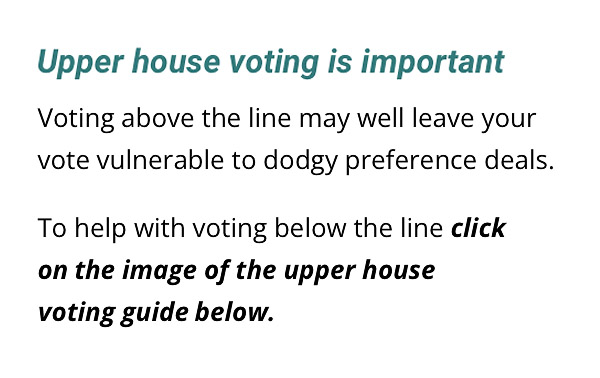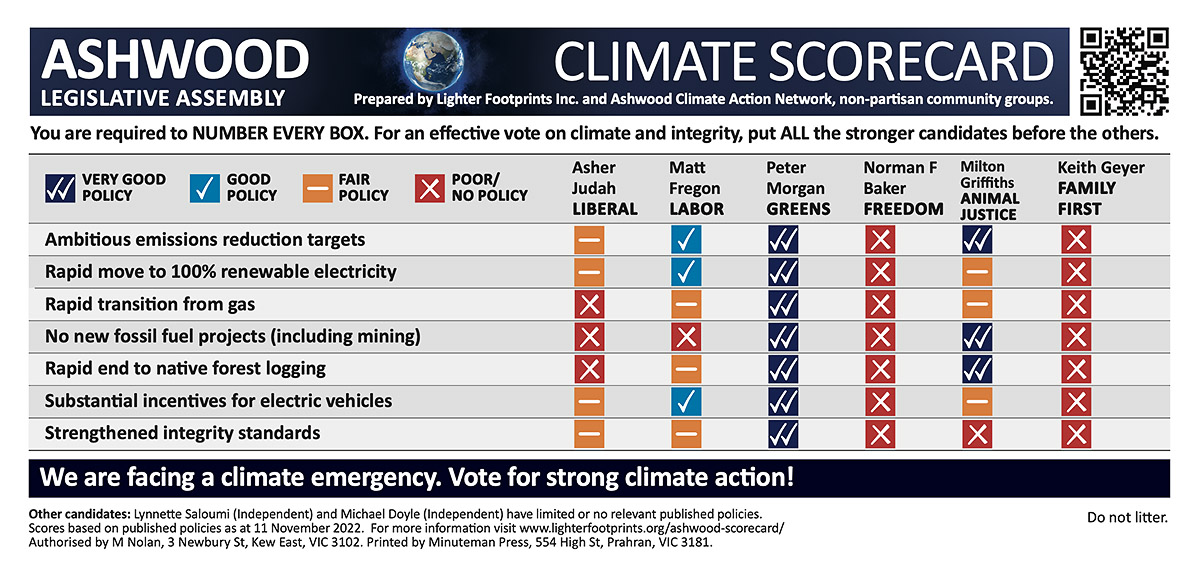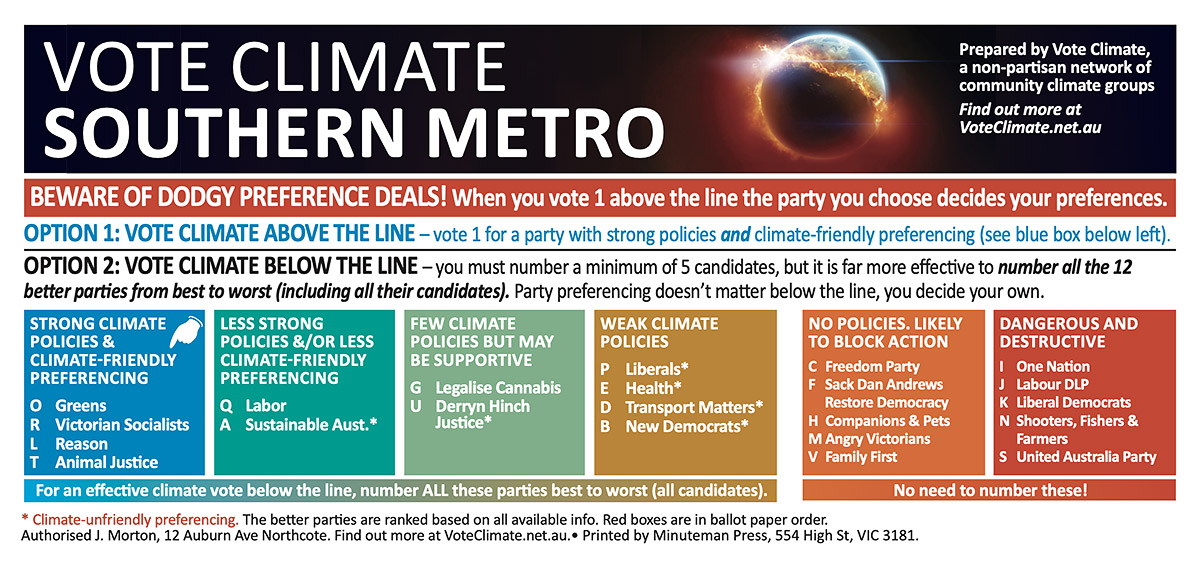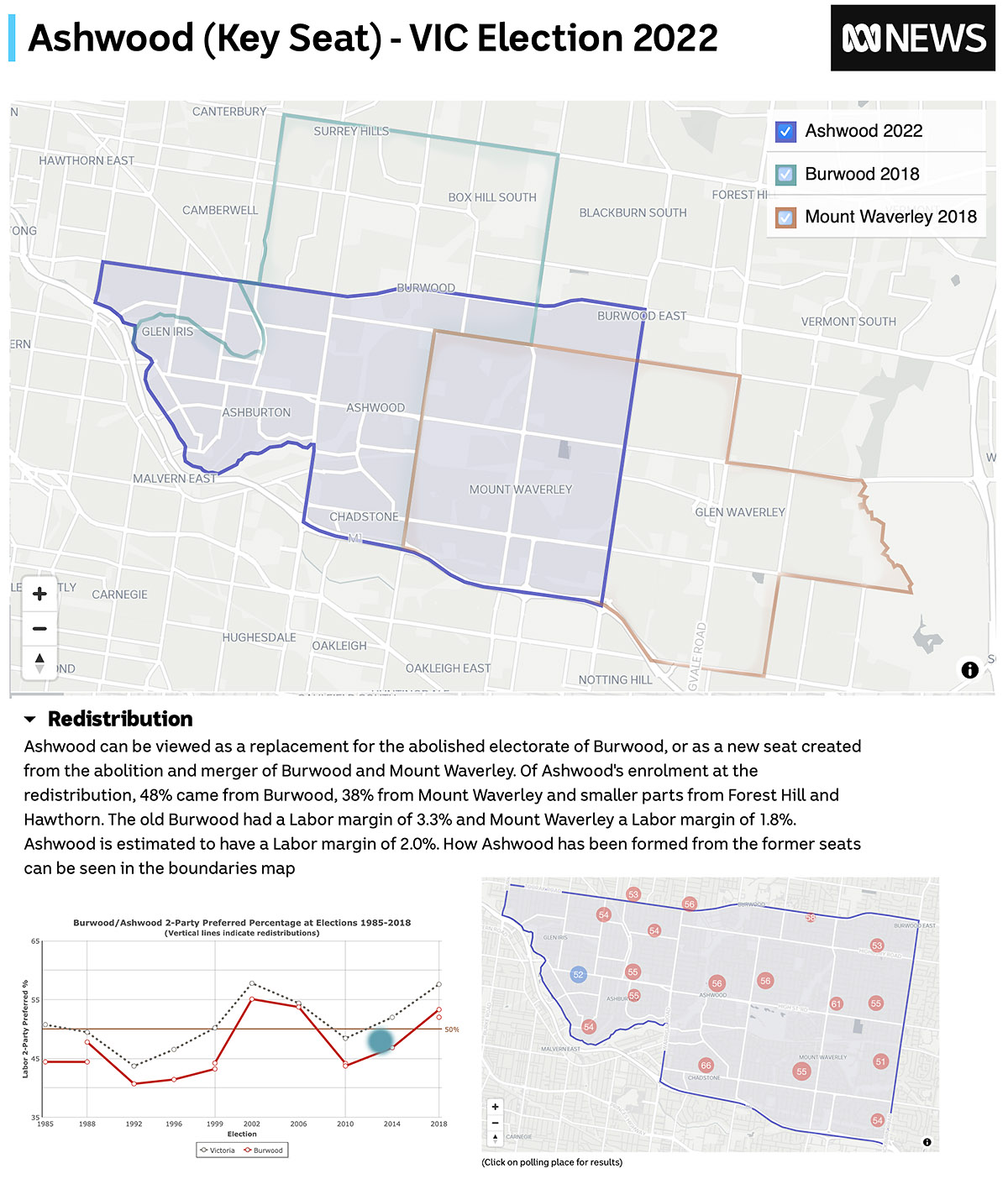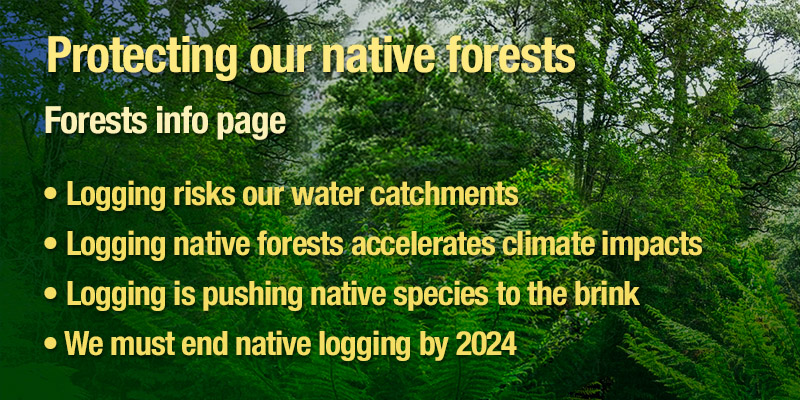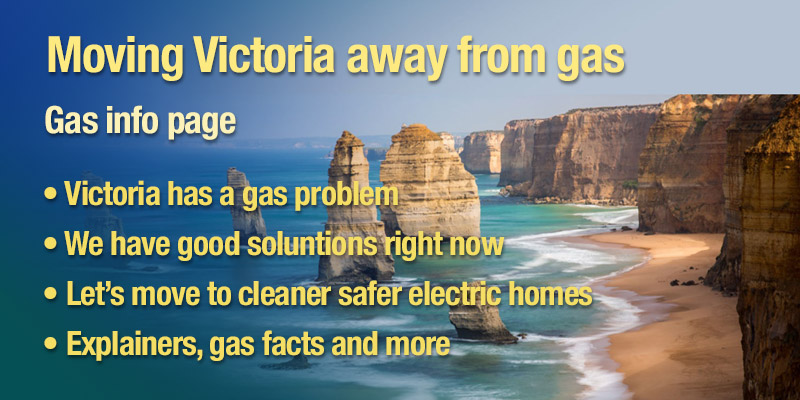
Your vote matters – makes sure it’s based on the facts!
Is there is a mood for change in Ashwood?
- Ashwood was created in 2022 to replace the seat of Burwood, held by Labor on a 3.3% margin
- Chisholm flipped to Labor with help from Greens preferences in May with a 6.9% swing.
- The seat redistribution has reduced Labor’s margin to 2.0% according to the ABC
- The Labor candidate is the MP for Mount Waverley – Ashwood includes some areas of Mount Waverley
- For a more nuanced discussion check out the Tally Room’s post on Ashwood here.
Ashwood Climate Candidate Scorecard
Information is critical to an informed choice.
This scorecard has been prepared by the Victorian Climate Action Network (VCAN) Scorecard Working Group in conjunction with local climate groups Lighter Footprints and Ashwood CAN.
Summaries of candidates policies and scorecard rationale
The scorecard rates candidates on six key climate policy areas and policies related to government integrity.
Each policy has been scored as VERY GOOD, GOOD, FAIR or POOR based on the candidates’ published policies.
Every effort has been made to be objective and fair in the scoring. Summaries of each candidate’s policies were prepared with a cut off date of 11th of November. Policies were scored using simple and clear criteria, and you can find the full scoring rationale here.
Lower House Voting
You must number every box or your vote will not be counted. Be sure to number the candidates with the strongest climate policies first. Even if your first choice is eliminated earlier in counting your vote will flow to your next preference at full value, and so on. You will have sent a clear message about the value of climate action.
Upper House Voting
Click on the voting guide image above to enlarge for more detail.
To vote for the Legislative Council (upper house) you can vote for just one party above the line, but it is important that the party has climate friendly preferencing.
To vote below the line, you must number at least 5 boxes, but it is far better to number as many good candidates or parties with good climate policies as you can, so your vote counts for climate action and avoids the impact of preference deals. Details of Southern Metro Scorecard scoring here..
Top election issues
Victorian voters want native logging to stop
Protecting our native forests is essential for a safe climate future
More on our forests information page here.
Logging is pushing our Mountain Ash forests to the brink
- Logging impacts the critically endangered Leadbeater’s Possum (numbers could be as low as 1000) and the endangered Greater Glider.
- Professor Lindenmayer presented evidence in 2018 that Victoria’s “Mountain Ash ecosystem is collapsing.”
- Over 50% of logged Mountain Ash coupes fail to grow back – logging is not sustainable.
Protecting our native forests is a highly effective way to reduce emissions.
- Our undisturbed native forests have some of the highest carbon stores in the world.
- Victorian native forest logging releases 3 million tonnes of carbon per year, as much as 700,000 cars emissions.
Logging increases bushfire risk and damages our water catchments
- Logged forest areas have a much higher risk of much more severe fires for up to five decades – ANU.
- Ending logging is an effective way of protecting Melbourne’s water catchments – each year of logging reduces our supplies by 15,000 megalitres, the equivalent used by 250,000 people.
Ending logging will protect taxpayer funds
- Victorians are paying for forests to be logged – a 2020 PBO study found that we would save around $20m/pa if we transitioned to plantation timber
We need to end native logging by 2024, 2030 is far too late
It’s time to accelerate the shift away from gas
Electrification will help protect our health and our climate
More on our Victorian gas information page here.
Electric homes are cleaner, safer and save on energy bills
- Electric heat pumps for hot water, and reverse cycle air conditioners (heat pumps) are very efficient, lowering emissions.
- Gas cooking increases the incidence of childhood asthma by 12% – UQ.
- An electric home saves over $1,000 per year, or double that with solar PV according to the Victorian Govt.
To meet Victoria’s climate targets we need to rapidly transition away from fossil gas
- Fossil gas in Victoria accounts for 17% of emission with 70% being used for heating and hot water – Victorian Government.
- Switching to efficient electric appliances for heating will lower the cost of energy bills for businesses and households.
Moving to renewables increases Victoria’s energy independence
- As one of the world’s biggest gas producers we don’t have a gas supply crisis, we have a market crisis – Victorian Government.
- Supporting rapid electrification, and demand reduction through energy efficiency, will increase energy resilience.
- Moving to electric appliances will reduce the impact of price shocks on households and businesses – Climate Council.
- New drilling or risky, polluting gas import facilities are not the answer.
To meet Victoria’s climate targets we need to move past gas
Support our Vote Climate campaign!
Strong climate action means moving to clean energy, electrifying homes and transport, preserving our forests, and getting off gas.
It’s time to put climate action at the heart of voting decisions, so Victoria can move forward and create a sustainable, thriving future.
Check out our Vote Climate page for information about our Vote Climate campaign, cutting through spin, and placing accurate information in the hands of voters.
Further information
Lighter Footprints
- Saving Forests, Ditching Gas – a quick summary of some of the most essential issues in the Victorian State election campaign – with veteran campaigners Freja Leonard, FOE and Victorian Forest Alliance’s Chris Shuringa.
- Quick analysis of Victoria’s Gas Substitution Roadmap – we can ramp this up!
- Forest defence essentials. What’s behind the new laws that criminalise forest defence (and make it harder for forest monitoring and citizen science)?
Acknowledgements
This scorecard was developed by members of the Victorian Climate Action Network Scorecard Working Group assisted by Ashwood CAN, and Lighter Footprints.
Victorian Climate Action Network (VCAN)
VCAN is a coordinating body for Victorian climate groups
Ashwood CAN
Lighter Footprints is a member Ashwood CAN which has been formed to coordinate the non-partisan Ashwood Vote Climate campaign.
This page is authorised by Lighter Footprints Inc, Register Number A0095302A, 12 Segtoune Street, Kew, Victoria

